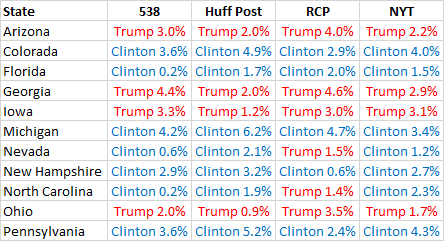Liam Hehir writes:
If you do arrive home on Wednesday next week to find that Donald Trump has somehow pulled it off, my advice would be to try not to worry too much about it. There will be an awful lot of hysterics from the media, of course. Nevertheless, things will probably work out OK.
In the forlorn hope that I will not be accused of being a Trump supporter for saying that, let me be clear that I cannot stand the man. If I were an American, I could never vote for him. At the start of this campaign my estimation was that he was a vulgar charlatan – and nothing that’s happened since has given me cause to reconsider that view.
That low opinion aside, the hysteria from the New Zealand media about this election has been over the top.
As an illustration of this, you needn’t look any further by an opinion piece recently published by Left-of-Centre broadcaster Radio New Zealand. The article condemns Trump for refusing to accept the legitimacy of the election in advance, of wishing to jail his opponents (based on a quip during the debate about Clinton’s alleged lawbreaking) and of fomenting violence in the pursuit of his aims. The conclusion was that Trump was threatening not only the integrity of the American electoral system – but the social contract and, indeed, civilisation itself.
Now, in fairness, I haven’t checked the author’s back catalogue of writings on American politics. It could well be that he has penned similar excoriations of those who claimed the 2000 election was stolen, of those publicly worried that the 2004 election would be stolen, against those members of the present administration who have talked of imprisoning climate change sceptics and who are acknowledged to have used the IRS to harass and attack Obama’s critics.
For all I know, he’s written similar screeds about the Clinton campaign in the wake of high-level Democratic operatives being caught on camera admitting to a strategy of trying to incite riots at Trump rallies.
Whether the criticism is consistent or one-sided hackery, it doesn’t take much reading to realise that politics and elections in the US has always been pretty dirty. That’s probably because it works – there have been some unsavoury characters in the White House over the years. The American republic has survived such people to date.
One of the dirtiest elections ever was 1800 Jefferson vs Adams. Read all about Jefferson’s attack dog, James Callender.
One of the key reasons for this is that the whole American system of government is designed to prevent election winners from overreaching. Despite his sweeping mandate in 2008, Obama’s first two years in office were frustrated by the procedural tactics of his opposition in Congress, the Supreme Court and state governments. In substance, he’s been a pretty ineffective president since the Republican takeover of the lower House in 2010.
In the media, this has generally been called “obstructionism”. Under a Trump presidency, the terminology would flip back to “checks and balances” in pretty short order. Were Trump to overreach, he would find himself consigned to lame-duck status pretty quickly.
He would also be loathed by the media which, despite its diminishing influence, is still a formidable opponent. In the second half of the last Bush presidency, we heard ad nauseum that “dissent was the highest form of patriotism”. For the most part, this has been set aside during the Obama presidency, with a preference for critiquing the critiques of the president. If Wikileaks is anything to go by, a similar spirit of deference and co-operation can be expected under a Clinton presidency.
Some argue the case for Trump on the basis that Clinton would face no opposition from the civil service or most of the media, while Trump would.
Having said that I still think Clinton is a preferable choice to Trump. At the end of the day Trump’s narcissism makes him an unsafe choice.
To repeat: I think Trump is an awful man who would be a terrible president. His qualifications for office are about the same as Paris Hilton’s – and I think she would probably do a better job. But if he is somehow elected, I don’t expect it to be the end of the world.
Very true. Except maybe in NZ where house prices will soar even higher as residents of New York, DC and LA flee to Auckland.




